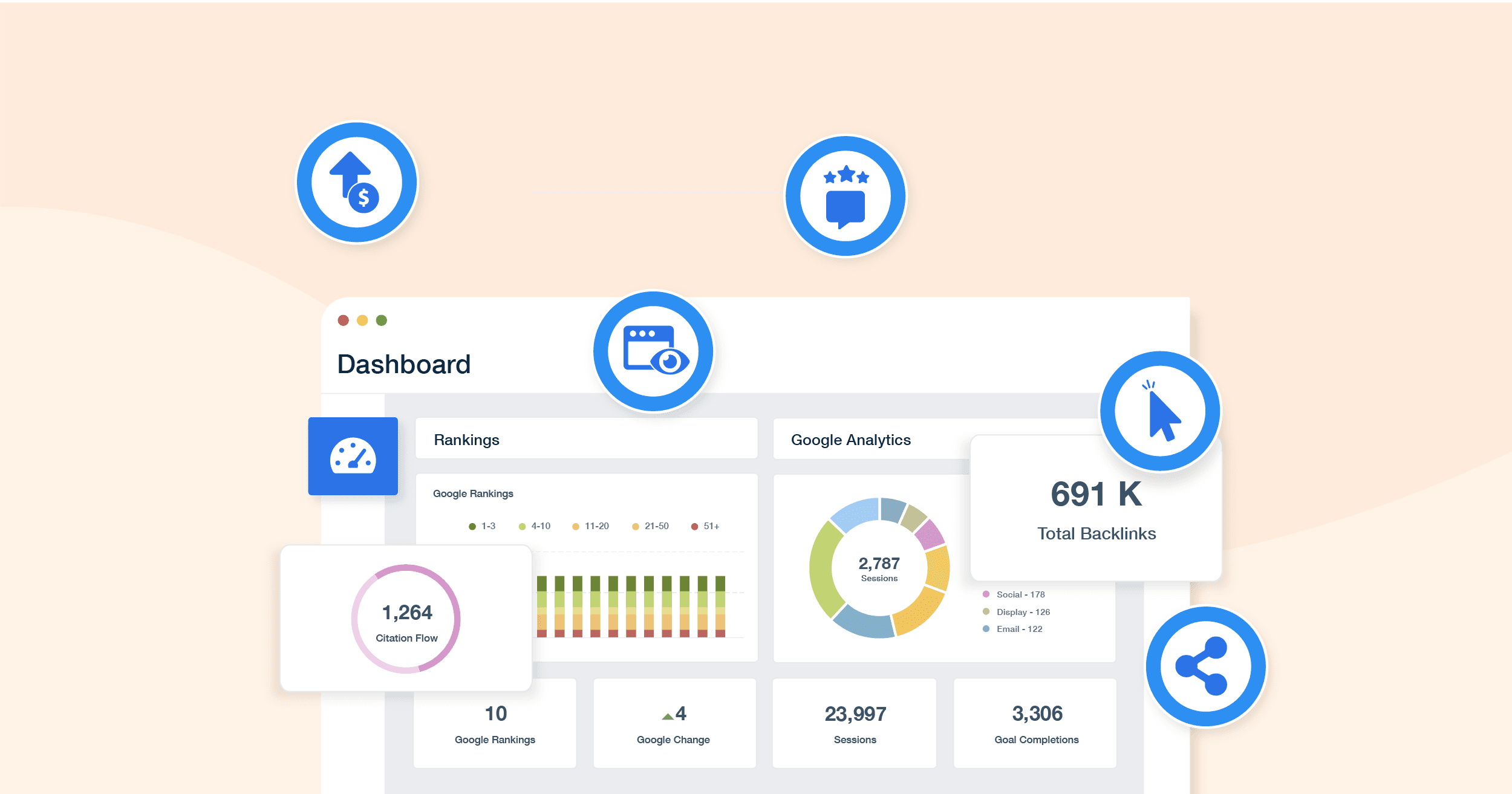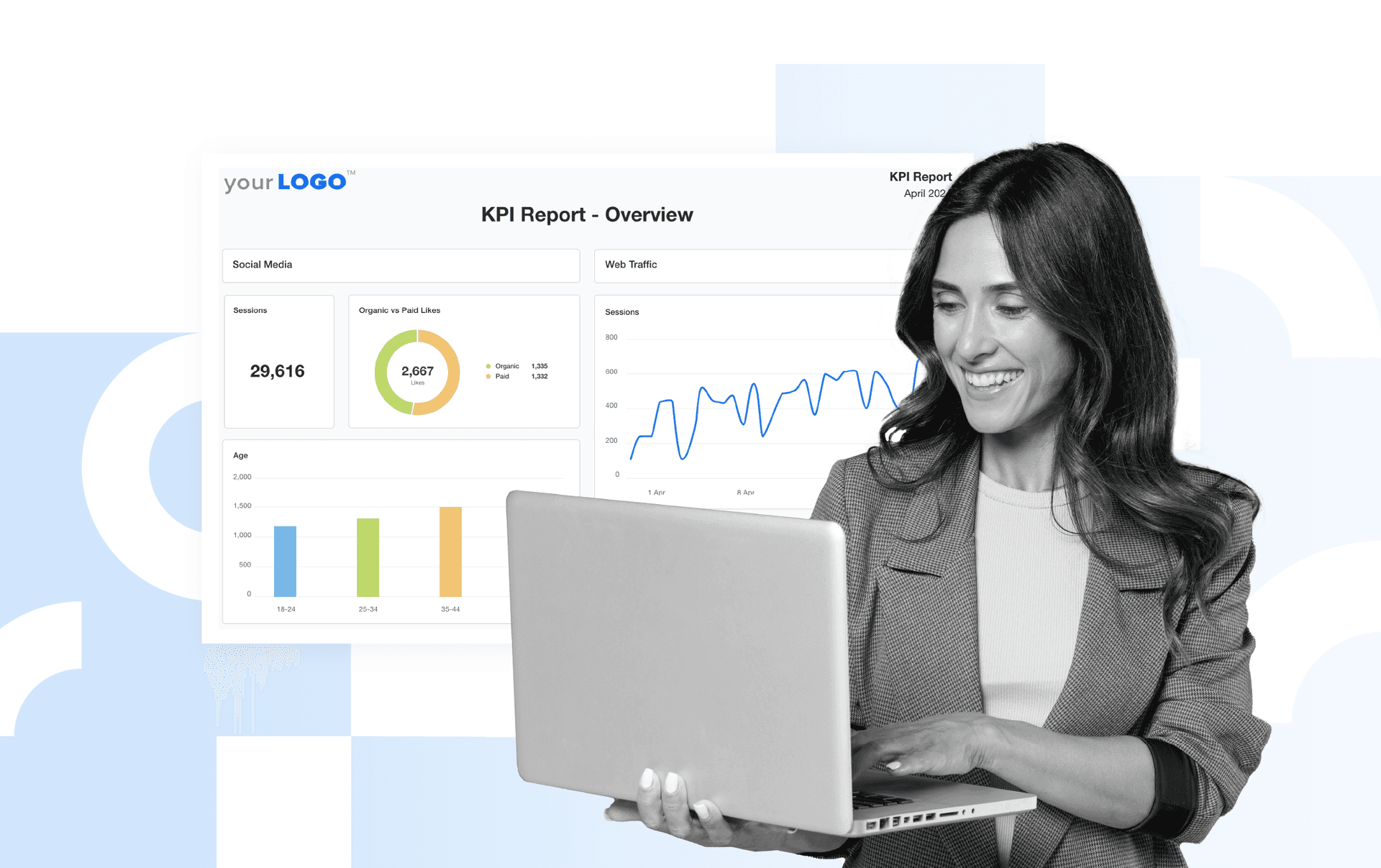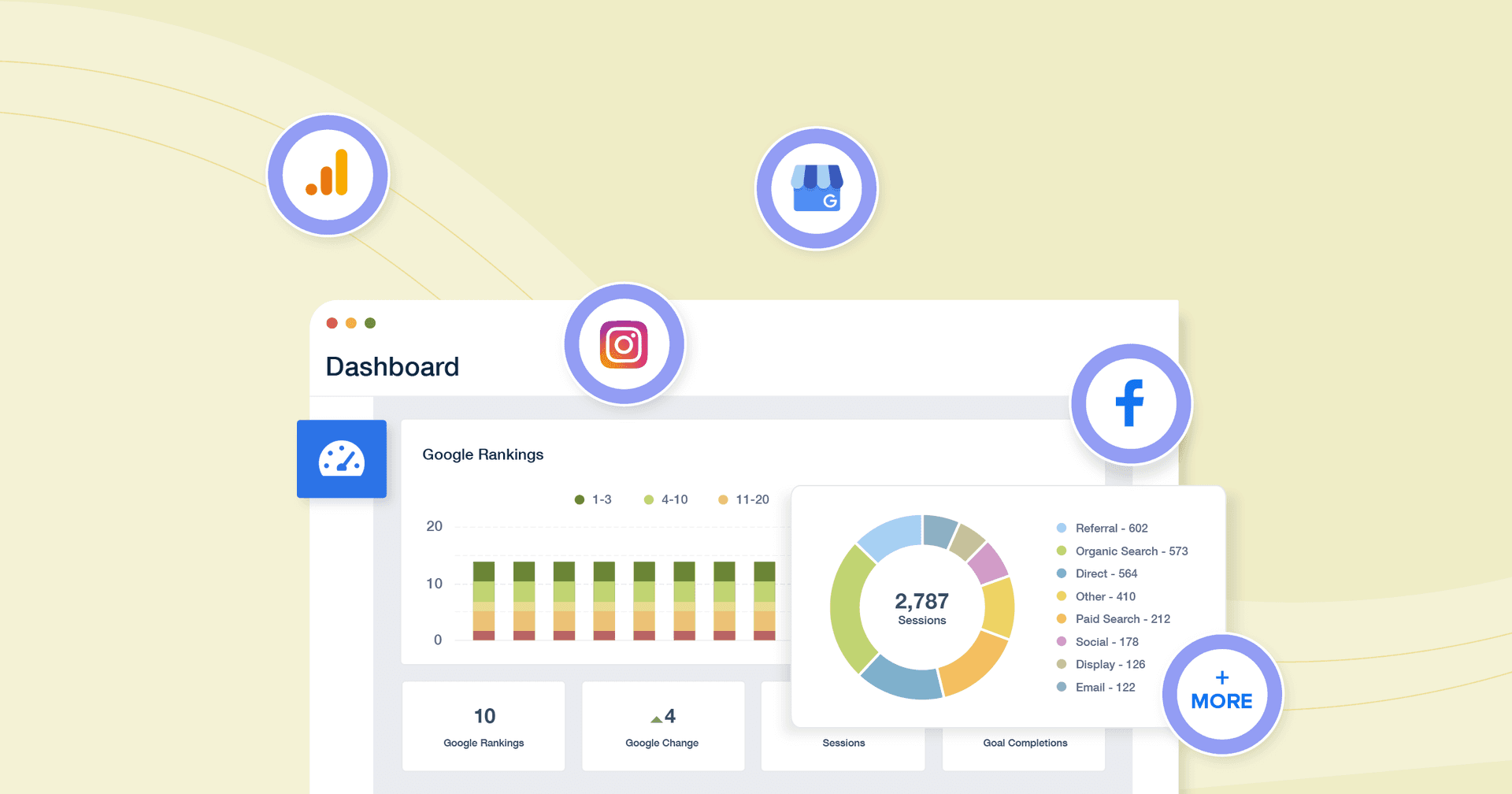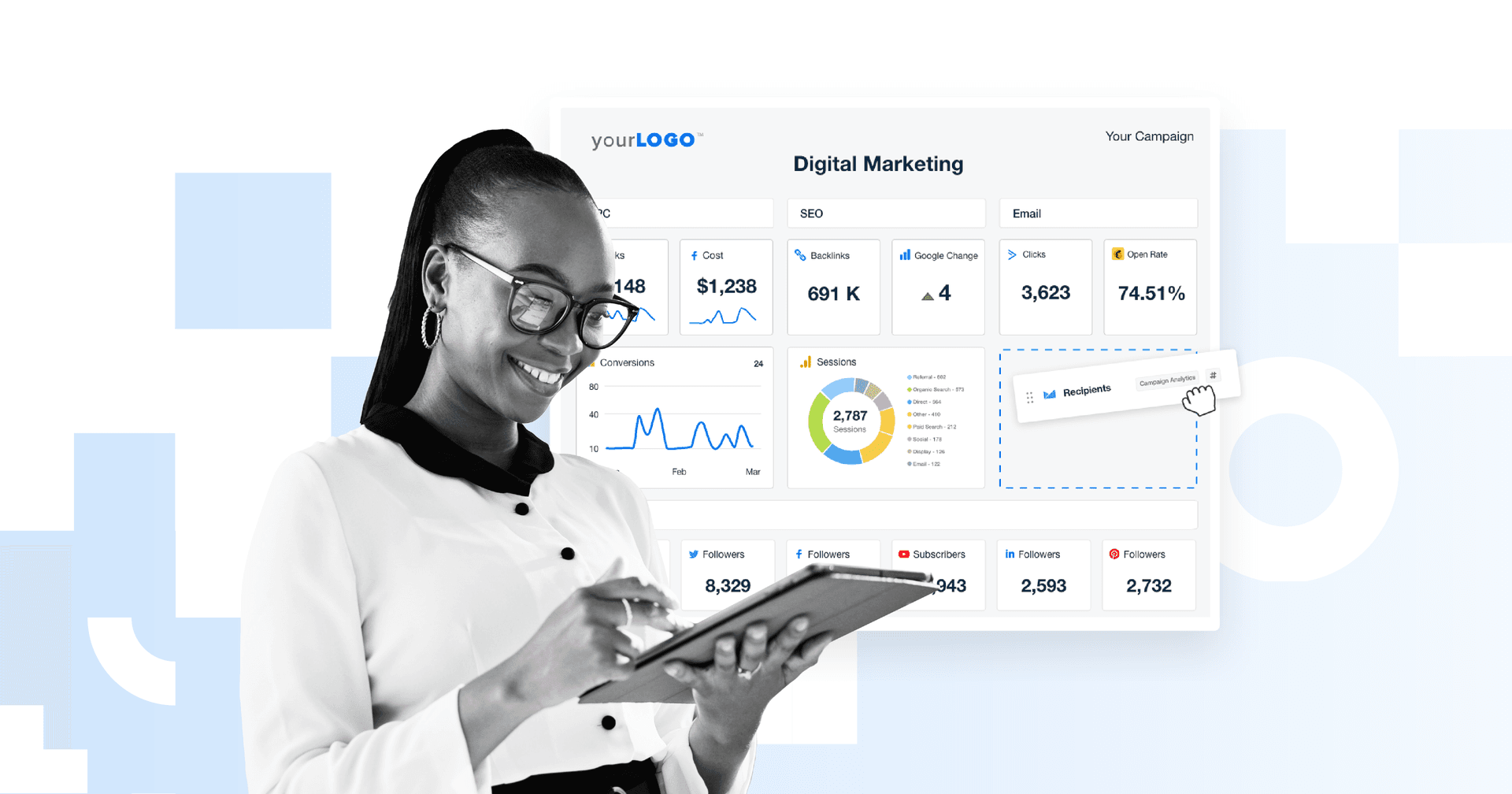Table of Contents
QUICK SUMMARY:
Content marketing KPIs measure how effective a marketing agency’s content efforts are, helping to track performance, understand audience engagement, and guide strategy. Evaluating the effectiveness of content marketing campaigns in generating sales and maximizing ROI is crucial for ensuring these campaigns deliver measurable value. This article shares the top KPIs for assessing content success, improving ROI, and aligning with long-term goals.
Content may be king, but there’s no crown jewel without marketing KPIs.
Assigning a numerical measure to creative output may not seem intuitive, but it’s the only way to assess performance (which is why you’re probably reading this article).
At the end of the month, clients likely have questions about the traction and ROI of that meticulously created content you spent hours or even days on. Or perhaps they’re being pressed by senior management or executives on the board level about the low social media engagement on a recent post.
How do you reiterate ROI in these scenarios, break it down in tangible terms, and demonstrate content performance?
The answer is simple–content marketing KPIs.
This article will uncover all the key insights you need to create a solid content marketing strategy and make informed decisions.
What Are Content Marketing KPIs?
What is a KPI? Before we dig into content-specific KPIs, let's start with the basics. A KPI, or Key Performance Indicator, quantifies an organization's success in reaching key objectives. It provides a clear metric for performance evaluation and strategic alignment, enabling businesses to measure progress and make informed decisions.
Marketing agencies and content marketers take great pride in their work and strive to create content that’s effective month after month. But when it comes to tracking content performance and demonstrating the long-term benefits of SEO, it’s not as simple as snapping your fingers to shift from ‘creator’ to ‘analyst’ mode. Not to mention the challenges of viewing content objectively when you’re the one creating it.
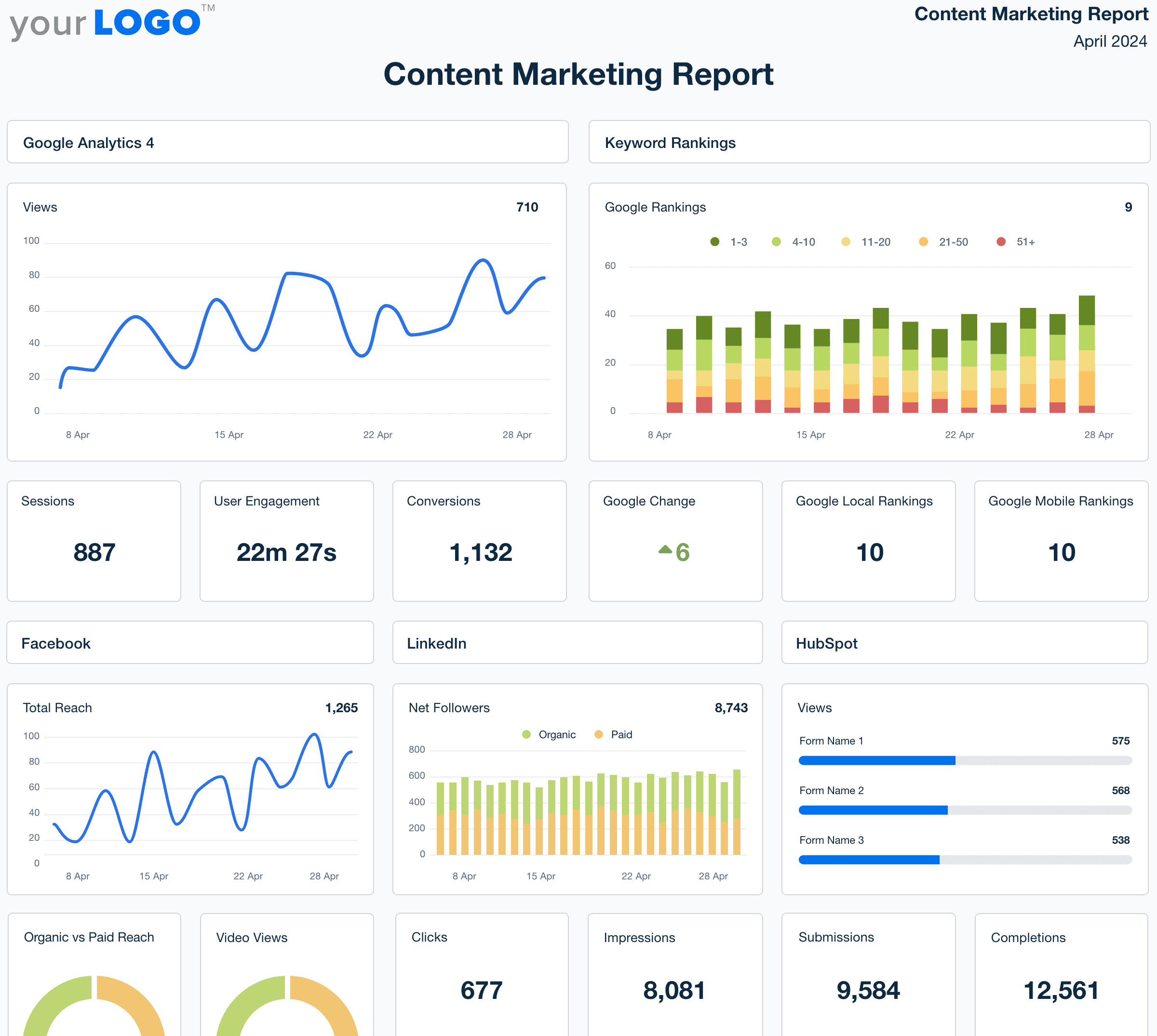
Use an easy-to-understand Content Marketing Report Template to provide key updates to your clients quickly and easily. Try AgencyAnalytics free for 14 days!
But after you’ve finished that fantastic piece of content and uploaded it based on your client’s posting schedule, how will you know what resonates or should be improved?
That’s why content marketing KPIs are needed.
KPIs keep us accountable. KPIs provide the client transparency into what work we deliver, and most importantly, KPIs demonstrate that we are on track and achieving mutually agreed upon goals - this is our agency's true north–results for clients.
–David Krauter, SEO Strategist, Websites That Sell
Remember the golden rule for all things marketing–you can’t improve what you don’t track, which is where content marketing objectives come in.
These quantifiable marketing metrics reflect how content has performed (e.g., how your client’s audience received it, if at all) and what direction you should take to create content that really resonates. Therefore, the benefits of data-driven insights are undisputed. In a nutshell, content marketing key performance indicators help you:
See what topics and content formats resonate with your client’s target audience
Monitor which distribution channels are most effective
Evaluate how content efforts align with your client’s long-term goals (e.g., increased website engagement)
Find opportunities to capitalize based on well-performing content (e.g., repurposing content, exploring backlink opportunities)
Reach your client’s target audience, drive website traffic, increase brand awareness by publishing high-quality content. It also helps your client to meet other marketing goals (e.g., generate sales leads, drive business growth)
Increase the chances of getting inbound links from credible sources
Create a content strategy that delivers results
Not only do these KPIs prove your worth and reiterate your agency’s ability to deliver results, but they also steer your client’s strategic ship in the right direction.
Repeat after us—content marketing KPIs are friends! They guide us towards content marketing success once we heed their insights.
What Makes a Good Content Marketing KPI?
We’ve all heard the term SMART goals. That trusty acronym stands for: Specific, Measurable, Attainable, Relevant, and Timely.
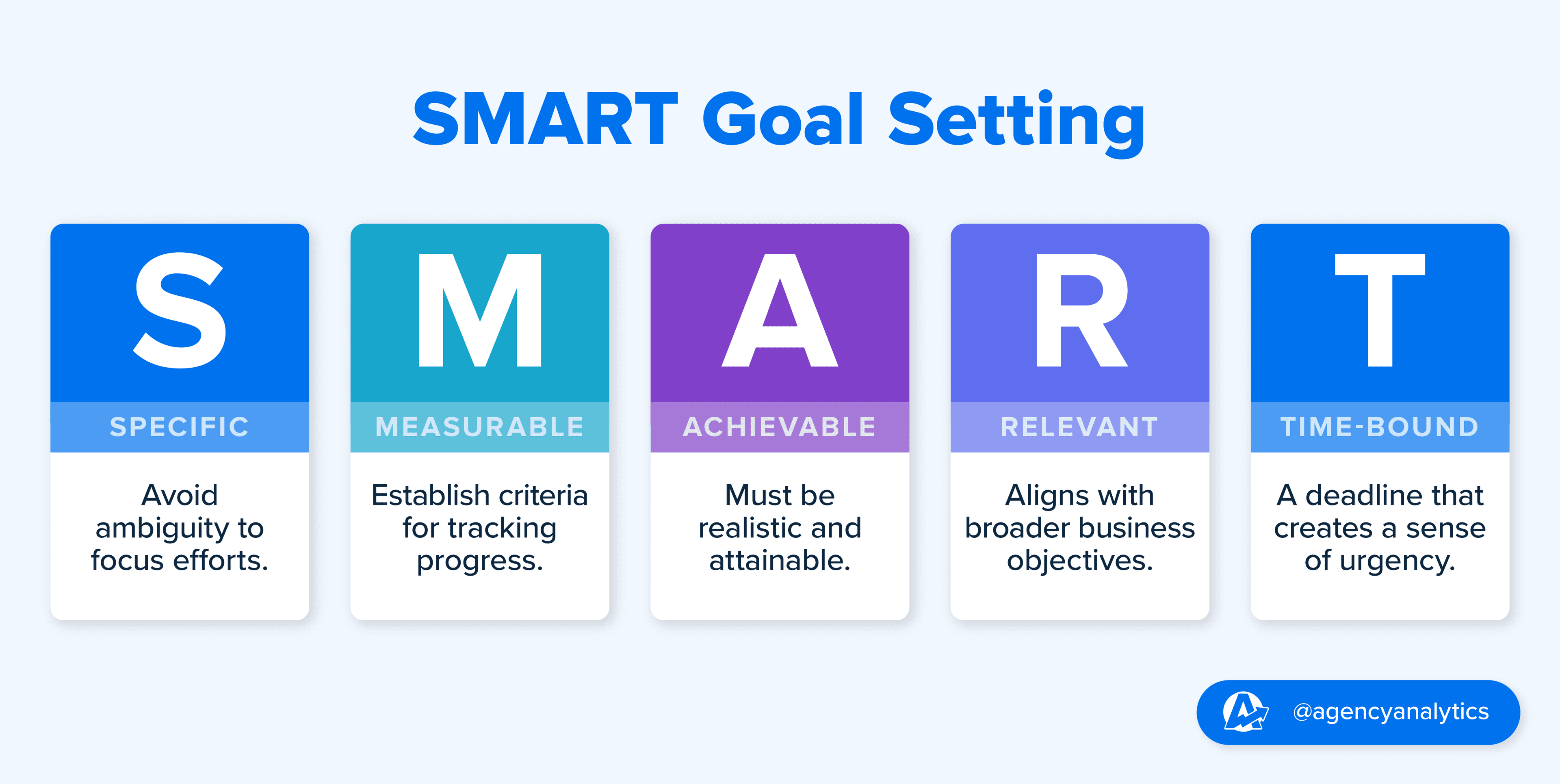
Although there are other goal setting frameworks to consider, a good content marketing KPI embodies these qualities and ensures you aren’t shooting in the dark or aiming unrealistically.
Here are some key questions to remember when coming up with those critical content marketing KPIs:
Is This Content Marketing KPI Specific to What My Client Is Trying To Achieve?
For example, if your client wants to measure the number of page views for a newly developed blog post, total website visitors won’t provide the level of specificity required. If the post was created specifically to generate leads, page views do not align with the goal. The KPI in this case should be the form conversion goal.
Find out exactly what they’re looking to track, and be wary of casting the net too widely. That way, you’ll be equipped to tailor and measure content performance with precisely what they want to achieve. And if the client doesn’t know exactly what the KPIs should be, use your expertise to guide them.
“During the sales process, we ask the client what KPIs they want to track; often they're unsure, and so we make recommendations based on their overall goals.”
–Paul Morris, Managing Director of Superb Digital
Is This Content Performance Measurable?
While an abundance of digital data is available, everything has limits. For example, consider a client with a free e-book download that’s gone viral.
Users may download an e-book page and forward it to their contacts on another messenger platform (such as WhatsApp), which could be considered a social media share that increases brand awareness. However, because these shares happen externally to your client's website, you may not be able to track and quantify this as a content marketing KPI and is happening in a digital realm that’s out of your control.
"Going Viral" is not a measurable KPI, partly because it's difficult to quantify exactly how many shares it takes before your client would consider it viral. Also, the entire concept of going viral is that the content takes on a life of its own beyond its original placement, making it nearly impossible to measure.
Is This Content Marketing KPI Achievable?
Let’s say your insurance client launches an educational blog series to increase article views and subsequently attract qualified leads through a call-to-action button.
If there’s an average of 50 leads coming in per month currently, a content marketing KPI of 10,000 new leads/month is likely not achievable–let’s be real. As a result, it’s in your agency’s best interest to advise your client to adjust those insurance sales quotas (especially if they’ve assigned an unrealistic target for content marketing efforts).
To avoid any unpleasant inquiries a few months down the road, have a frank discussion about what’s achievable and why some expectations can’t realistically be met.
Is This Content Marketing KPI Relevant to My Client’s Goals?
Say a client’s exclusive goal is increasing organic traffic to a webpage about recent social corporate responsibility initiatives. In this case, having ‘revenue generated’ as a content marketing KPI isn’t relevant to the marketing campaign.
While a conversion performance indicator may be applicable later, it won’t reflect their current objectives.
Remember that the four main purposes of content are to educate, inspire, entertain, or convert. It’s important to align the KPIs to one of those relevant purposes.
Does This Content Marketing KPI Have a Timeframe?
Deciding on a KPI without a timeframe leaves things up in the air. Don’t have content KPIs fall by the wayside–assign a realistic time frame to track progress on a regular and consistent basis. Setting a timeline also sets expectations for delivery and allows your agency to plan effectively.
Agency Tip: It may be tempting for you (or your client) to track content marketing KPIs on a frequent basis, and this is warranted in some instances. However, work with your client to determine an appropriate time frame, expectations, and realistically what they can expect. Content may take time to build traction so make sure your KPIs are reported at an appropriate interval.
How To Choose Relevant Content Marketing Objectives
When deciding on KPIs, always remember that they should tie directly into your client’s strategic goals.
If there’s a misalignment between the two, think twice about whether it’s really a KPI or metric. Remember that all content marketing metrics aren’t necessarily KPIs–it really depends on your client’s strategic goals.
Are you looking for a quick, general reference for content KPIs? Here are a few important ones to consider.
Content Marketing KPIs To Boost Brand Awareness
Your client’s goals may include building brand authority, driving website traffic, and being a top-of-mind brand. Therefore, you’ll need content marketing KPIs that reflect this.
For content-first brand awareness campaigns, track the following metrics and use them to create a data-driven content marketing program. It is essential to track brand awareness metrics, such as organic website traffic and brand mentions, to assess and improve brand visibility and recognition in alignment with business objectives.
KPI | Why It Matters |
|---|---|
Page Views | Using Google Analytics page view data will give you an idea of what the traffic is like to web content such as blog posts, product pages, and any other related material. It’s also useful to track the number of unique page views and the average time spent on a page to gauge which content resonates most. |
If your client’s content is being shared on social media, it increases reach and also the possibility of brand recall from other users. | |
When your client’s business is mentioned by users on social media, it shows brand recognition and maximizes reach potential. | |
New, Relevant Backlinks | When other websites link to your client’s content, it shows that the content is relevant and authoritative (provided the referring website is a credible source). |
New Social Media Followers | If you notice an uptick in social media followers, it may mean that your client’s content is getting increased visibility and interest. That's why follower growth is one of the top social media KPIs. |
Search Ranking | A higher search ranking is one of the most common SEO KPIs to track, as it means your client’s content is relevant and authoritative (which is what you’re aspiring for). |
Overall Search Visibility | This percentage indicator shows your client's keyword ranking by evaluating the number of clicks their content receives. High overall organic search visibility means greater brand awareness and organic website traffic. |
Content Marketing KPIs To Increase Engagement
These performance indicators measure how users interact with and react to your client’s content. Tracking content marketing KPIs is crucial for evaluating engagement, as it provides insights into audience preferences and the efficiency of content distribution channels. During the consideration phase, content marketing KPIs are especially important to track–it gives an idea of where users are on the tipping scale when deciding which brand to go with.
KPI | Why It Matters |
|---|---|
Click-Through Rate | The click-through rate indicates a percentage of how often users click on links or calls to action within your client’s content. In turn, you’ll have a better idea of how inclined users are to engage with content, sign up for more information, or even read all the way through. |
Bounce Rate | This is another Google Analytics indicator that will tell you how many users leave your client’s website. |
Time on Page | If your client created a long-form blog, you don’t want to see a 5-second time per page KPI. |
Pages per Session | This formula is calculated by taking a user’s total number of page views and dividing it by the total number of sessions on your client’s website. |
Mailing List Subscriptions | Users who sign up for your client’s mailing list are clearly interested in receiving content directly. This is a good content marketing KPI to keep on your radar, as a growing subscription rate is a promising sign. |
Content Marketing KPIs for Conversion
Understanding and tracking key performance indicators for content marketing is essential to measure the effectiveness of your efforts in driving conversions.
These KPIs provide valuable insights into how well your content resonates with the audience and drives desired actions, such as sign-ups, lead generation, downloads, or purchases. By analyzing these metrics, you can optimize your strategies to achieve better results (aka paying customers), demonstrate ROI, and maintain client satisfaction.
KPI | Why It Matters |
|---|---|
Conversion Rate | To determine an appropriate conversion rate, evaluate what your client views as success when a user takes a particular action. |
Revenue Generated | If your client has calls-to-action within their content marketing efforts that involve some form of user payment, revenue generated is an important content marketing KPI to track. |
Qualified Leads | Leads are one thing, but digital marketers know that qualified leads are another (which is probably what your client is most interested in). This KPI will also show you whether your client’s content is reaching the right type of leads. |
“Ultimately, what is their ROI from our efforts? When you can clearly demonstrate this month over month, it increases your retention rate and keeps clients paying you month after month.” –Jacob Hicks, Owner of Magnyfi
Content Marketing KPIs for Retention
Content marketing doesn’t necessarily stop after leads have passed the conversion phase. Depending on your client’s product offering, there may be a need for onboarding and retention content. For example, a client that offers accounting software may offer support after onboarding, such as help docs, video tutorials, FAQ pages, and tips.
In turn, these customers have the potential to become brand loyalists and advocate for your client’s business once they’re satisfied with the product and level of support. Don’t turn a blind eye–track relevant KPIs to maximize this potential for your client’s successful content marketing strategy.
KPI | Why It Matters |
|---|---|
Content Consumption | These KPIs would be similar to the acquisition KPIs such as page views, time on page, video views, etc. However, these would focus exclusively on content that has been created to help the customer get the most out of the product or service. |
If your client offers a product or service that’s geared toward repeat or subscription-based customers, monitor the churn rate. | |
Newsletter Open & Engagement Rates | Repeat customers still interested in your client’s brand and/or product offering will likely contribute to newsletter open rates and engagement rates. |
Referrals | If an existing customer refers your client to someone else, it shows confidence in their brand (and content, by extension). Keeping track of this KPI will give insight into content relevance and create opportunities for incentivizing brand advocates. |
Agency Tip: With so many content marketing KPIs to keep track of, it becomes way too easy to fall off track–especially if you’ve got a growing roster of clients. Create a marketing dashboard to consolidate your client’s content marketing goals and KPIs in one place (in addition to other relevant analytics). That way, you won’t have to spend valuable time scouring multiple platform backends looking for those relevant figures.
What to Consider Before Choosing Your KPIs for Content Marketing
To build a solid bank of content marketing KPIs, there’s some groundwork to do beforehand.
Organizational structures differ across businesses, and so do budget allocations, business objectives, and resources. Because of this, you will find variations in how clients tie long-term objectives into marketing. Before deciding on content marketing KPIs, understand the big picture and make recommendations accordingly.
For example, take a client in the pharmaceutical industry wanting to generate revenue in the next quarter. As a result, their leadership team may evaluate top-performing products and decide which ones to create more content for, with hopes of driving more sales.
With this information, your agency will be equipped to provide strategic content marketing and digital ad spend recommendations. In turn, these key factors influence their content marketing KPIs to measure their efforts towards this goal.
Agency Tip: Understanding the customer experience will give your client relevant insight into their pain points and unique circumstances. Use this to inspire new content marketing ideas. Client feedback is an invaluable guide to setting applicable content marketing strategies and the KPIs to measure success.
Common Content Marketing Metrics That Should Not Be KPIs
Not everything needs to be reported on. But how do you know where to draw the line? Here are a few things to consider when it comes to content marketing KPIs worth tracking (or not).
1. Social Media Likes
“Stop worrying about how many likes you have–consumers really don’t care! They don't like you because of how many Page Likes you have. They like you because they believe in what your brand stands for.” –Cheryl Ingram, Managing Director of The Digital Media Collective
While social media likes give you some indication of audience engagement, it doesn’t necessarily mean users aren’t engaging with the content.
How often have you read an article on social media without actually liking the post? We’ve done it, too. Likes are nice to have, but they don’t paint the overall picture of content performance.
2. Total Number of Backlinks (Without Context)
While many backlinks may look appealing on a monthly client report, it doesn’t mean much if your client’s content shows up primarily on link farms or spammy websites. That’s why reporting on the number of backlinks per month is misleading if it’s not done within context.
To combat this, consider backlink monitoring. That way, it’s much easier to keep track of high authority backlinks and weed out any compromising links.
3. Number of Comments
Again, take this figure with a grain of salt. It’s definitely useful to see how users engage with your client’s content, and it even provides actionable insights into user sentiments. However, comments don’t necessarily affect your client’s bottom line and won’t give a solid ground for content marketing performance.
Content Marketing KPIs Lead to Client Success
The road to content marketing success is paved with KPIs. It takes a bit more thought and digging deep into what should be reported or included on an agency dashboard, but it’s the only way to evaluate how content is performing. It’s tedious to manually keep track of those content marketing KPIs month after month, especially when you’re in that creative zone.
Wondering what the long-term solution is? Create a content marketing dashboard through AgencyAnalytics and streamline the entire process. With over 80 marketing integrations (including Google Analytics), sending an in-depth content marketing report has never been more intuitive.
It’s as easy as: Add Your Client > Add Marketing Integrations > Set Up KPIs to Monitor. Empower your agency with AI-powered dashboard reporting software that highlights what matters.
Simple, effective, and incredibly time-saving! Create a data-driven content marketing strategy and monitor key performance indicators with ease.
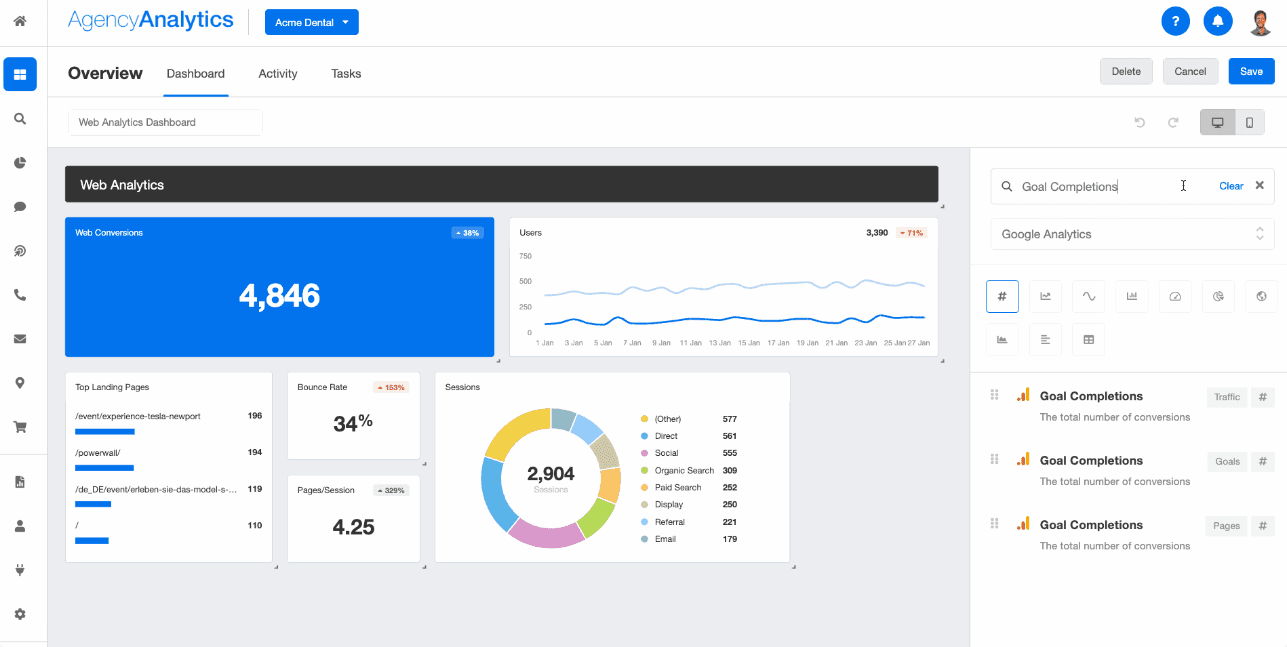
Take the hassle out of your client’s reporting process and access content marketing KPIs at the click of a button. Try AgencyAnalytics free for 14-days–no credit card required.

Written by
Faryal Khan is a multidisciplinary creative with 10+ years of experience in marketing and communications. Drawing on her background in statistics and psychology, she fuses storytelling with data to craft narratives that both inform and inspire.
Read more posts by Faryal KhanSee how 7,000+ marketing agencies help clients win
Free 14-day trial. No credit card required.



